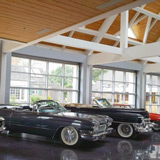
Architectural Vertical Opening Solutions - Plus!
About the Provider
Renlita Custom Opening Solutions specializes in custom design and fabrication of vertical and horizontal operating doors. With a variety of options and capabilities, Renlita products can be used in retail, commercial and residential applications. Renlita’s in house design team works with architects and customers to meet their individual design objectives. Every project is shipped complete including finishes, glass, cladding, motor and accessories.
Course questions/comments
903-583-7500
Learning Objectives:
- Compare and contrast various types of vertical operating systems as well as identify the advantages and disadvantages of each to reveal operational, maintenance, and safety features
- Explain how vertical operating systems interact with the building structure to utilize the design space more efficiently and reduce energy costs
- Determine how counterweight balance systems benefit users in terms of ease of operation as well as contribute to the welfare of occupants by allowing more natural daylighting into buildings
- Describe how vertical operating systems comply with required regulations, reduce material waste, and contribute to a sustainable design with LEED certification
Provided By:
Design Category:
(08) Doors, Windows and Openings





